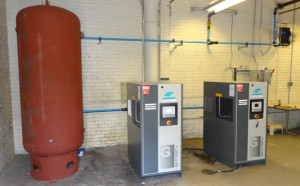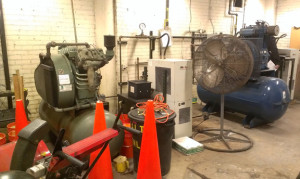A Detroit-area business is saving money and using less energy thanks to a chance meeting of two business leaders at a University of Michigan School of Engineering program.
With new air compression equipment in its manufacturing area, this organization is saving more than $6,000 annually and using 54,000 fewer kilowatt-hours each year. That represents a 75% annual reduction in the energy required to operate the air compressor system.
They also are also enjoying increased capacity (and the ability to add more capacity if needed) and the elimination of a pressure drop in one part of the building.
Over the expected 20-year life cycle of the equipment, the company should save more than $124,000 and achieve a 186% return on investment, according to Scott Ringlein, CEO of the Energy Alliance Group of Michigan, coordinator of the project. The company also received a utility rebate of over $3,000 from DTE Energy.
EAG first learned of an opportunity to work with this organization when Ringlein met one of its vice presidents while they were participating in a project with University of Michigan Engineering students.
After identifying the opportunity to improve the compressed air system, Ringlein called one of its technology partners, Air Technologies®, an industry leader in the compressed air system segment.
After monitoring and evaluating the existing air system for more than a week, Air Technologies® proposed the installation of Atlas Copco variable speed drive compressors, some of the most efficient and quietest systems on the market today.
“When we looked at the old equipment, we saw what we often see — very old machines, oil leaks, unnecessary piping, machines running really hot, free-standing fans to cool them down and unrelated items stored nearby. That’s not uncommon,” according to Darryl Kukla, Senior Sales Engineer at Air Technologies®.
“Sometimes we feel like companies treat compressed air systems as their last priority, rather than their number four utility. They may buy cheaper equipment and then suffer through problems later,” added Kukla, who has been in the compressor industry for more than 25 years.
Air Technologies® is often called when a company’s compression system breaks down, can’t keep up with production or offers poor air quality with things like water and oil found in the air lines. “These problems never get better, they just get worse, adding excessive replacement and/or maintenance costs to their operation,” Kukla said.
Not only did the organization get all new equipment, they achieved more floor space as the new compressors require much less space as the refrigerated air dryer, oil water separator and filters are built into a single package.
EAG and Air Technologies® also replaced older air lines for two reasons 1) to decrease operational air pressure (A reduction of 2 PSI at the compressor cuts the electrical power cost by 1%) and 2) to provide more balanced air volume throughout the facility.
“So far everyone seems to be very happy with the new system. It works well and they’re really surprised how quiet it is. The old system was really, really noisy,” Ringlein added.
This was the first project that EAG and Air Technologies® worked on together, but it won’t be the last. Since finishing that project, they are now working together on a much larger project upgrading air compression systems in six U.S. manufacturing plants owned by a Canadian-based automotive supply company.
The Energy Alliance Group (EAG) is an energy solutions and cost recovery company providing energy-saving products, technologies and services. EAG’s clients are assured the greatest energy savings and maximum return on investments by being guided through the complexity of technology and service choices, utility and tax incentives and project financing alternatives.
EAG partners with a variety of energy and cost recovery experts so it can provide comprehensive service to all its clients. To see a list of EAG partners and affiliates, please click here.


Leave a Reply